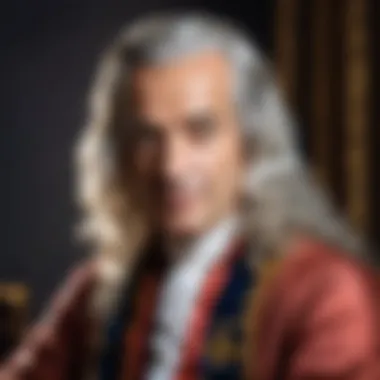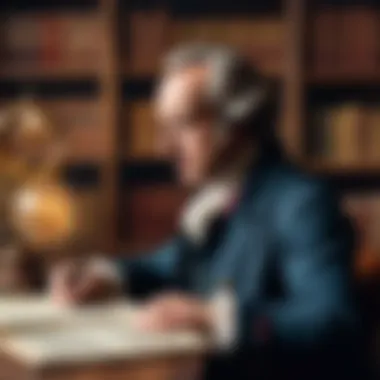Eighteenth-Century French Writers: An In-Depth Analysis


Intro
The eighteenth century stands as a pivotal era within French literature, marked by a plethora of influential writers whose works shaped not only the literary landscape but also the societal and philosophical frameworks of their time. This period, often referred to as the Enlightenment, witnessed the emergence of distinct literary genres that reflected the thoughts and debates of the age. Writers such as Voltaire, Jean-Jacques Rousseau, and Denis Diderot played crucial roles in this cultural movement, each contributing uniquely to the discourse on politics, philosophy, and human existence.
In this exploration, we will highlight key literary genres of the period, classify their characteristics, and analyze the profound impact these writers had on the evolution of French literature. The following sections will provide an in-depth overview of the major genres, a critical examination of their works, and how they resonate with the themes of their era.
Основные жанры литературы
Understanding the primary literary genres that emerged during the eighteenth century is essential for grasping the full scope of its literary contributions. This era saw a diversification in genres, with novel forms developing alongside traditional literary expressions.
Классификация по жанрам
- Philosophical Novels: These works often explore ideas and ethical dilemmas. They invite readers to reflect on morality and societal constructs.
- Essays: Writers utilized essays to articulate their thoughts clearly. This genre allowed for personal reflection and discourse on various topics, from government to individual rights.
- Satire: A powerful tool for social commentary, satire was employed to criticize the government, institutions, and societal norms. Notable figures like Voltaire excelled in this genre.
- Dramatic Literature: The theatre flourished in the eighteenth century, with both tragedies and comedies addressing complex themes and human emotions.
Особенности каждого жанра
Each genre held unique features that distinguished it from the others, contributing to the rich narrative complexity of the era:
- Philosophical Novels: They blend narrative with philosophy, often incorporating dialogues to engage readers in intellectual debates.
- Essays: Characterized by a personal voice, essays reflect the author’s views and invite readers to consider alternative perspectives.
- Satire: This genre thrives on exaggeration and irony, providing critical insights into societal failings while entertaining.
- Dramatic Literature: Theatrical works often employed staged discussions on morality and ethics, making them accessible to the masses.
Literature of the eighteenth century serves not merely as a reflection of its time, but as a crucible for enduring ideas and controversies that continue to resonate in contemporary discourse.
Рецензии на книги
This section delves into some of the most prominent works of this period, revealing the depth of thought and craftsmanship inherent in eighteenth-century literature.
Обзор популярных книг
- Candide by Voltaire: A satirical novella that critiques optimism and the philosophy of the time.
- The Social Contract by Rousseau: This work discusses the formation of political communities and social obligations.
- Jacques the Fatalist by Diderot: A novel that examines free will and determinism.
Анализ литературных произведений
In analyzing these texts, one can observe the interplay of ideas and styles:
- Candide serves as both comedy and tragedy, where Voltaire scrutinizes the absurdities of life.
- The Social Contract presents a radical view on democracy and governance, proposing that legitimate political authority rests on the will of the people.
- Jacques the Fatalist employs metafictional techniques, questioning narrative conventions and the nature of storytelling itself.
Overall, the intricate relationship between genre and thematic exploration in eighteenth-century French literature provides invaluable insight into the era's intellectual achievements. Through these writings, we see not just literary innovation, but also cultural and political awakening that has had lasting impacts.
This encapsulation of genre and analysis of key works form a foundation for understanding how these writers propelled the evolution of literature and thought in their time.
Overview of Eighteenth-Century French Literature
Eighteenth-century French literature marked a pivotal era in the evolution of literary forms and thought. This period is characterized by the emergence of profound philosophical ideas, literary innovation, and a stark critique of social norms. Understanding this overview is vital, as it sets the framework for analyzing significant writers and their works that defined the age. The influences of the Enlightenment played a crucial role in shaping literature during this time, promoting values such as reason, individualism, and skepticism of tradition.
One benefit of studying this period is gaining insights into how literature reflects cultural changes. The writings from this era challenged the status quo, examined the human condition, and addressed moral questions that resonated deeply with society. These literary developments also led to sophisticated narrative techniques that often blurred the line between fiction and philosophy.
Key considerations in this overview include acknowledging the social and political upheaval of the time. The discontent with monarchy and feudalism spurred literature that aimed not only to entertain but also to inform and provoke thought. As readers will discover, the works of notable authors intertwined personal experiences with broader societal critiques, creating a rich tapestry of ideas that continue to influence modern literature.
"In literature, as in life, what matters is not just the story told, but the questions it raises about existence, society, and humanity."
This exploration uncovers the relationship between writers and the historical context in which they operated, emphasizing the importance of acknowledging various perspectives that shaped literary output. By examining these components, readers will appreciate the significance of eighteenth-century literature and its enduring legacy in shaping intellectual thought.
Major Literary Movements


The study of major literary movements in eighteenth-century French literature is essential for understanding the intricate dynamics that shaped the era's intellectual output. These movements were not merely artistic expressions; they were reflections of the societal shifts and philosophical advancements occurring at that time. The Enlightenment and the emergence of Romanticism stand out as pivotal forces, each contributing distinct ideas and styles that influenced writers and their works.
Enlightenment
The Enlightenment was a cultural and intellectual movement that emerged in France in the late seventeenth century and flourished through the eighteenth century. This period was marked by an unwavering belief in reason, scientific inquiry, and the potential for human progress. Thinkers and writers sought to challenge traditional authority and explore ideas that contributed to civic life, human rights, and political thought.
Writers such as Voltaire, Rousseau, and Diderot played significant roles during this movement, using their works to disseminate Enlightenment principles. Voltaire's wit and advocacy for freedom of speech and religion made him a prominent figure. Diderot's editorial work on the Encyclopédie was a monumental effort, gathering rich intellectual discourse and making it accessible to a wider audience. Rousseau, through his disquisitions, fostered thoughts on individual freedom and societal structures that challenged entrenched conventions.
The themes of the Enlightenment often revolved around:
- Reason: Emphasizing rational thought as the primary source of authority.
- Empiricism: Advocating for knowledge gained through observation and experimentation.
- Individualism: Promoting personal autonomy and the importance of the self in political and social matters.
Overall, the Enlightenment established frameworks that would influence modern thought and inspire future literature across various genres.
Romanticism Emergence
While the Enlightenment emphasized reason, the emergence of Romanticism in the late eighteenth century began to emphasize emotion, nature, and the individual experience. This movement countered the rationalism of the preceding era by valuing feelings, imagination, and the subjective experience of life. French Romanticism also sought to respond to the changing social landscape instigated by the French Revolution and the subsequent upheaval.
Romantic writers, such as Chateaubriand and Lamartine, redirected focus toward personal expression and the beauty of the natural world. They often critiqued the rapidly industrializing society and lauded the idea of the individual hero battling against convention and societal norms. Through their poetry and prose, they explored themes such as:
- Nature: As a source of inspiration and a reflection of human emotion.
- Passion: Highlighting the importance of strong emotions and personal connections.
- Freedom: Advocating for artistic and personal liberation from societal constraints.
As Romanticism gained momentum, it significantly impacted various genres, particularly poetry and fiction. The emphasis on individual perspectives and emotional depth would eventually pave the way for further literary explorations in the nineteenth century and beyond.
"In every work of art, the creator conveys the emotional and philosophical underpinnings of their social realities."
Understanding these major literary movements provides valuable insight into the complexities and evolution of French literature during the eighteenth century. Each movement contributed to an ongoing dialogue that enriched both the literary canon and the broader cultural landscape.
Key Authors of the Era
The eighteenth century produced a myriad of influential writers whose works shaped not just French literature but also the landscape of Western thought. These key figures helped to articulate the philosophies of the Enlightenment, challenge societal norms, and provoke intellectual discourse. Their writings often acted as a mirror reflecting the political climates, social upheaval, and the burgeoning ideas surrounding individualism and rational thought. Furthermore, the diversity in their styles and themes offers a rich exploration of human experience that continues to resonate today.
Voltaire
Biographical Overview
Voltaire, born François-Marie Arouet in 1694, was one of the most prominent literary figures of the Enlightenment. His sharp wit and fervent criticism of dogma defined his philosophy and social commentary. Voltaire’s tumultuous life, marked by conflicts with the French government and the Church, drove him to exile where he continued to write prolifically. This journey not only showcases his resilient spirit but also reflects the era's tension between authority and individual expression. Understanding Voltaire’s life is crucial as it illuminates how external struggles shaped his revolutionary ideas and writings.
Key Works
Among Voltaire’s numerous works, "Candide" stands out as a hallmark of satirical literature. This novella critiques the optimism of the day while exposing the absurdity and harshness of life. The philosophical tale, with its mix of comedy and tragedy, has endured through time. Its unique approach combines sharp humor with serious themes, proving to be a beneficial choice for any literary analysis. It becomes clear that Voltaire utilized narrative not only to entertain but also to enlighten readers on philosophical pessimism.
Philosophical Themes
Voltaire’s philosophical writings often emphasized freedom of speech and separation of church and state. His advocacy for civil liberties remains relevant today. By distilling complex ideas into accessible discourse, he managed to reach a broad audience. This democratization of philosophy has significant advantages, as it encourages critical thinking and social critique among readers, fostering a more informed public.
Jean-Jacques Rousseau
Biographical Overview
Jean-Jacques Rousseau emerged in 1712 and quickly became a pivotal figure in philosophy and literature. His life journey, from a humble background to a celebrated intellectual, reflects the changing social structures of his time. Rousseau's experiences in exile led him to articulate radical ideas about individuality and societal constructs. His biography offers insights into the interplay between personal history and philosophical evolution, making it a relevant choice for understanding his contributions.
Key Works


One of Rousseau’s seminal works, "The Social Contract," discusses the legitimacy of state authority and the concept of popular sovereignty. His revolutionary ideas challenge the status quo of governance and individual rights, emphasizing the importance of collective will. This critical examination of the relationship between individuals and society makes it a key text in political theory, illustrating Rousseau's lasting impact on modern politics.
Impact on Education and Politics
Rousseau redefined education through his treatise "Emile, or On Education," promoting natural education and child-centered learning. This work's innovative approach profoundly influenced modern educational practices. His focus on nurturing the individual's moral and emotional development reflects a progressive view that resonates in contemporary pedagogical discussions. Its nuances instruct a deeper understanding of education's broader social implications.
Denis Diderot
Biographical Overview
Denis Diderot, born in 1713, became a leading figure in the French Enlightenment, known especially for his role in the creation of the Encyclopédie. His life exemplifies the intellectual fervor of the time, as he sought to gather and disseminate knowledge across various fields. Diderot’s decision to challenge existing norms and to promote the pursuit of knowledge through his works makes understanding his biography essential to grasping the era's intellectual context.
Contributions to the Enlightenment
Diderot's contributions span beyond the Encyclopédie. He advocated for materialism and critical thinking, which were foundational to Enlightenment thought. His works stimulated intellectual debate and encouraged questioning of established beliefs. This advocacy for rational thought aligns Diderot closely with other Enlightenment thinkers, positioning him as a key influencer in shaping contemporary discourse.
Role in the Encyclopedie
The Encyclopédie served as a monumental achievement that compiled human knowledge in various disciplines. Diderot’s editorial vision emphasized reason over superstition, profoundly impacting European intellectual movements. Its organization of knowledge into accessible formats exemplifies his commitment to spreading enlightenment ideals. The Encyclopédie remains a remarkable demonstration of collective knowledge that foreshadows modern encyclopedic endeavors.
Montesquieu
Biographical Overview
Montesquieu, born in 1689, was an influential philosopher and political thinker. His background as a member of the French nobility provided him with unique insights into the structures of power. His observations of governmental systems around Europe led to a critical analysis that emphasizes the importance of checks and balances. This understanding is vital as it forms the foundation of many modern democratic principles, demonstrating why Montesquieu is a pivotal figure in political thought.
Key Works
"The Spirit of the Laws" is Montesquieu’s most significant work, where he analyzes various political systems and introduces the idea of separation of powers. This concept influenced the development of modern democratic institutions and constitutional frameworks worldwide. His analytical style and clarity of thought provide crucial insights into governance, making it an essential text for political philosophy studies.
Absorption of Social Science
Montesquieu’s work laid the groundwork for what would later emerge as social science, emphasizing empirical observation and analysis. His methodologies encouraged subsequent scholars to apply systematic approaches to studying society and politics. This emphasis on observation makes Martins an essential figure in the evolution of social sciences, with his theories still resonating in contemporary disciplines.
François Rabelais
Influence on Satire
François Rabelais, though earlier than the Enlightenment thinkers, influenced satirical literature significantly. His work demonstrates a complex blend of humor and critical thought. Through his sharp wit in works such as "Gargantua and Pantagruel," he examined societal norms and human folly. This ability to engage readers while provoking thought is a vital aspect of satirical writing, and Rabelais’s contributions provide a rich resource for understanding the evolution of satire.
Major Contributions
Rabelais's texts delve into themes of humanism and critique of contemporary society. His unique narrative style and use of language advanced the literary form. This innovation not only entertained but also challenged readers to reflect on their own lives and worldviews. Understanding his contributions helps appreciate how early literary forms paved the way for later developments in French literature.
Legacy in Literature
The legacy of Rabelais in literature is evident in his lasting influence on subsequent authors and literary traditions. His bold use of language and subversion of norms opened pathways for writers to explore complex themes regarding humanity and society. Rabelais’s work serves as a reference point for humor and critique, foundational to understanding the development of European literary traditions.
Themes and Philosophical Underpinnings
The themes and philosophical underpinnings of eighteenth-century French literature are essential to understanding the era's literary output and cultural impact. Writers of this time grappled with significant ideas and societal issues, and these themes shaped their narratives as well as their criticism of contemporary life. The core philosophies reflect the intellectual climate that influenced the transformation of not just literature but also social thought and political discourse.
Humanism and Rationalism


Humanism and rationalism are foundational elements in the literature of the 18th century. They emphasize the importance of human experience and reason over divine or supernatural explanations. This focus on human potential established a new framework for understanding the world. Writers such as Voltaire and Diderot utilized these concepts to critique established authority and celebrate individual thought.
The impact of rational thinking is particularly notable in the works of Enlightenment philosophers, where arguments are constructed logically rather than relying on traditions. This shift had a profound effect on education, as it promoted critical thinking and questioned dogmatic beliefs. Thinkers encouraged others to nurture individual capacity for reason, impacting political ideals and the quest for equality.
Critique of Society
The literature from the eighteenth century often presented a thorough critique of society, addressing issues ranging from class disparity to government oppression. Authors utilized satire, essays, and novels to expose the hypocrisy and corruption of their times. Works, such as Voltaire's "Candide," scrutinized optimism and challenged complacency among the populace.
Moreover, Rousseau's writings prompted readers to reflect on the social contract and the influence of civilization on human nature. He argued that society corrupts the innate goodness of individuals. Such discussions about societal constructs provided a platform for revolutionary ideas that eventually played significant roles in subsequent social movements.
Individualism vs. Collectivism
The theme of individualism versus collectivism emerged prominently in the writings of this period. This juxtaposition reveals tensions between personal freedom and societal responsibility. Rousseau famously grappled with this contrast, arguing for the importance of individual rights while recognizing the necessity of community bonds.
Writers often portrayed characters torn between their aspirations and the demands of society, highlighting the struggle for self-identity against societal expectations. In Diderot's works, for instance, one can observe the exploration of personal struggles as reflective of broader social realities.
Ultimately, these themes create a rich tapestry that showcases the complexity of human thought and society. They provide insights into the ways literature can comment on and influence the political and philosophical landscapes of its time. Understanding these undercurrents enhances appreciation for the profound influence of eighteenth-century French literature in shaping modern thought.
Impact on Modern Literature
The impact of eighteenth-century French writers extends far beyond the confines of their time. They laid foundational texts that fueled the intellectual vigor of the modern literary landscape. These writers, through their exploration of themes like individuality, society, and rationalism, shaped the trajectory of literature and philosophy that continues to resonate today. Their works inspire a diverse spectrum of contemporary genres, from critical essays to avant-garde novels.
Influence on Future Generations
The legacy of the eighteenth-century writers is palpable in modern literature. Influences are seen in the realms of narrative structure, character development, and thematic depth. Writers such as Virginia Woolf and James Joyce drew from the introspective and revolutionary style established by figures like Jean-Jacques Rousseau. The fragmented narrative seen in their work echoes the philosophical explorations that characterize much of Diderot’s writing.
Moreover, the Enlightenment's emphasis on reason and individual rights paved the way for future movements like Romanticism and Realism. Current authors often grapple with the same societal questions posed by their predecessors, reflecting an ongoing dialogue between past and present.
"The insights of the past must be critically engaged with to inform the struggles of the present."
Continuation of Themes
Various themes established in the eighteenth century persist in modern literary discourse. The ongoing exploration of humanism and rationalism is evidenced in current discussions around moral philosophy and ethics in literature. Furthermore, the tension between individualism and collectivism remains a central pillar of contemporary narratives. Authors today often find themselves revisiting the complex interplay between personal experience and societal structure.
Additionally, literature serves as a universal medium for critique. The themes of social justice, power dynamics, and normative correctness found in the essays of Voltaire find echoes in current sociopolitical commentaries.
The wisdom of past authors serves not merely as a reference but as a catalyst for innovation, allowing modern writers to break new ground while standing on the shoulders of giants.
Legacy of Eighteenth-Century French Writers
The legacy of eighteenth-century French writers is profound and far-reaching. Their contributions did not merely shape the literary landscape of their time; they also laid the groundwork for future literary and philosophical exploration. The writers of this period engaged with ideas that interrogated the function of the individual in society, the pursuit of knowledge, and the critique of existing political and social structures. Their works continue to resonate today, influencing contemporary thought and literature.
Cultural Influence
Eighteenth-century French writers exerted a significant cultural influence that transcended borders. Their thoughts effectively captured the essence of the Enlightenment, advocating for reason, empirical evidence, and individual rights. Voltaire’s satire and sharp critique of authority, for instance, made readers question accepted norms. Rousseau offered a perspective on natural human goodness and the corrupting force of society, which inspired revolutions and reforms. These writers exposed societal flaws and prompted discussions that were essential to the evolution of modern democratic ideals.
- Key Elements of Cultural Influence:
- Promotion of secularism and rational thought
- Advocacy for social reform and critique of oppression
- Inspiration for revolutionary movements, especially during the French Revolution
Their influence can also be seen in literature. The forms they pioneered, such as the novel and the essay, evolved to incorporate personal experience and social critique. This transition allowed writers to convey deeper emotional and psychological insights, enriching Western literature.
Literary Canon Formation
The works of eighteenth-century French writers have been essential in shaping the literary canon. Many of their writings are studied at academic institutions around the world, reflecting their enduring relevance and impact. The establishment of the literary canon meant recognizing certain works as foundational texts that inform various disciplines, including literature, philosophy, political science, and history.
- Significance of Literary Canon Formation:
- Establishment of Key Texts: Works like "Candide" by Voltaire and "The Social Contract" by Rousseau are fundamental in understanding Enlightenment thought.
- Diverse Genres: Their exploration of different genres has led to the rich intertextuality that characterizes modern literature.
- Critical Thinking Foundations: The ideas presented by these authors continue to serve as a reference point for critical debate and philosophical inquiry.
The literary canon not only preserves these important texts but also facilitates ongoing conversations about ethics, governance, and humanity. The legacy of these writers stands as a testament to their role in shaping intellectual discourse and cultural identity.



